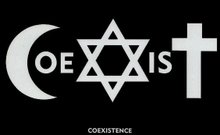How Do You Interpret The Bible?
 "It will greatly help you to understand scripture if you note – not only what is spoken and written, but of whom and to whom, with what words, at what time, where, to what intent, with what circumstances, considering what goes before and what follows."
"It will greatly help you to understand scripture if you note – not only what is spoken and written, but of whom and to whom, with what words, at what time, where, to what intent, with what circumstances, considering what goes before and what follows."
--Miles Coverdale
I would venture to say that there are as many interpretations of the bible as there are readers of the bible. Everyone who reads the bible, interprets it, no matter how "objectively" they approach it. I've never met anyone who holds the EXACT same understanding of the Bible. There are many schools of thought on how to interpret the bible: literally, figuratively, culturally, or historically, (i.e. flawed humans sincerely wrote down a testament to or of God's truth, but still were subject to err). Many readers combine a variety of methods to interpret biblical texts. Even the most staunch literalists admit to figurative aspects of scripture, such as Jesus' parables or instances when makes statements like: "...Drink my blood and eat my flesh..." Obviously Jesus in not literally telling us to drink blood and eat flesh, He's using a metaphor to symbolize the nature of salvation and the importance of His sacrifice.
Lately, I have been reading books written by scholars who hold different views of the bible and how it should be interpreted, from conservative evangelicals all the way to agnostic unbelievers. It's very important to me to challenge my beliefs by honestly listening to the views of others, not just automatically dismissing any notion that runs contrary to my beliefs and assumptions. The latest book I finished reading on the subject of bible interpretation is:
"How To Read The Bible: History, Prophecy, Literature--Why Modern Readers Need To know the Difference and What It Means For Faith Today," written by Steven L. McKenzie, a professor of Hebrew Bible at Rhodes College in Memphis, Tenn.
McKenzie explores the notion of genres in the bible. He claims that certain books within the bible are of different genres and therefore have different purposes, contexts, and methods to convey truth. Some are literal, others are figurative, some satirical, others poetic, some prophetic, and others historic. He also elaborates on the ancient concepts of prophecy, history and literature and how they differ from modern understanding. I learned greatly from this book, although I did not agree with many of its conclusions. But the most important thing to be gained from books like these is this: Literalists often accuse nonliteralists (or partly literalists) of not taking the bible seriously or randomly picking and choosing which parts to take literally or not. I am finding that many people who hold alternative views DO indeed take the bible seriously, more seriously than I have, if I am being honest. They take it SO seriously that they have learned the original languages fluently to read and compare the earliest manuscripts of the bible and have mastered the histories and cultures from which bible texts emerged to better understand the context, language, purpose, and style.
Now, that doesn't mean that every conclusion nonliteralists/partly-literalists arrive at is the end all be all, it just means that accusing them of haphazardly picking the parts of the bible that suits their tastes to be taken literally is just not the case. I was guilty of making that accusation as a teenager. Now, I realize there is a very in depth process of sifting through biblical text and uncovering their genre, intent, and meaning. Agree or disagree with the conclusions, but give credit where credit is due. McKenzie, in particular, holds the Bible in VERY HIGH REGARD and asserts that there is nothing wrong with the bible, but only people's understanding of it. The debate is not about IF the bible is truth, but which form truth takes in each book of the Bible. His analysis of the book of Jonah was absolutely astounding. I will forever read the book of Jonah with new eyes because of it.
Strengths: It's thought-provoking and challenging and will introduce you to the world of textual criticisms and biblical interpretation.
Weaknesses: McKenzie, like a true scholar, tends to be a bit tedious and repetitive in explaining textual jargon.
Read, if you dare. :)
Read, if you dare. :)
"The Bible is a harp with a thousand strings. Play on one to the exclusion of its relationship to the others, and you will develop discord. Play on all of them, keeping them in their places in the divine scale, and you will hear heavenly music all the time."
--William P. White















13 comments:
Tia,
Marcus Borg likes to speak of "taking the Bible seriously, without taking it literally." Another less known scholar modified it a bit -- "taking the bible seriously, without necessarily taking it literally." The issue here in interpreting the Bible is to understand its context and its style and its purpose. The problem is quite simple really, you just have to build a bridge between the world of 2 millennia ago to today. Well it's not simple, but that's our task.
Too often we read it flatly, as if everything is of equal importance, everything speaks revealingly of God, but the truth is, it simply isn't the case. So, we must read it with discerning/prayerful eyes.
So, keep reading!
That is a great quote you have at the top of this post by Miles Coverdale. It really is so important for us to look at Scripture in context which is what McKenzie is talking about when he talks about the different genres. I didn't really get this before this past year. But for example, Proverbs is poetry and when we interpret it we need to take into account the fact that it is a wisdom book and not a book of commands.
Sounds like you are learning a lot. By the way, I found your blog randomly through someone else's blog and have been enjoying it. I think you have a fresh perspective on things.
why thanks! :)
Tia, I am appalled that you would even promote a book on your blog that falsely teaches that the bible is not literal from cover to cover, let own AGREE with some of this McKenzie’s heretical teachings. This is a dangerous deception you have put forth and I suggest you take it off if you want to remain a biblical Christian.
Anon, I am thrilled you believe the bible is completely literal. If your beliefs are built upon a solid foundation of truth, then you should be able to listen to someone else’s perspective without being threatened. I did not agree with everything in this book, but I learned a-whole-nother segment of Christian’s take on the bible, their reasoning for it, and how it affects their faith. That’s why I recommended this book. It’s important for me to know where other people are coming from, without assuming I already know their motives, methods, and reasoning. There were some very intriguing arguments in this book, from which I learned a great deal. You can take it or leave it, agree or disagree, but please, oh please, don’t strip me of my “biblical Christian” status!
Word for Word inspired, spelled out by the Creator Himself. Anything short of the belief in the bible as an absolute literal divinely gift is unacceptable and a teaching of the enemy.
marcus, than read the book and write one to refute it. Engage it, think about it, take it down if you must, but don't mindlessly dismiss it.
Anon and marcus demonstrate the predicability of stereotypical literalists. Any counter argument or interpretation even mentiioned threatens their fragile beliefs. Instead of putting forth evidence to support their beliefs, they lash out with flimsy moral indignation and condescending assumptions. Keep up the good work, of challenging people to think for themselves, tia.
I had to read this book when I was in seminary. The intro on Jonah shocked me too. At first, I wanted to scoff at the idea that Jonah could be a satirical parable. But upon further investigation and rereading the text, I found myself laughing out loud at how ridiculous of a character Jonah was. Suddenly a much more potent message about the depth of God’s grace and man’s hypocrisy and hardened hearts was clear through this satire, that is buried in the more literal interpretation. Good book.
I've always wondered about different biblical readings beside the one I've been taught. I'd like to alteast know what others have deduced from the same book.
I knew you didn't have solid faith. People with faith wouldn't even entertain these false teachers.
Cassidy, dear, do you spew childish accusations founded on nothing but the ugly combo of ignorance and arrogance on EVERY blog you visit? Because that's all you seem to do on here. It's uncontructive and accomplishes nothing except halting all meaningful verbal exchanges and the chance to learn from each other.
Seth
I also have recently heard the unfathomable (great word when discussing fish stories) depth of Gods grace and the obstinance of mans rebellious heart (aka; mine) in the book of Jonah, very strongly indeed, although, i still think of it as literal..little man, big fish, Bigger God.
Post a Comment